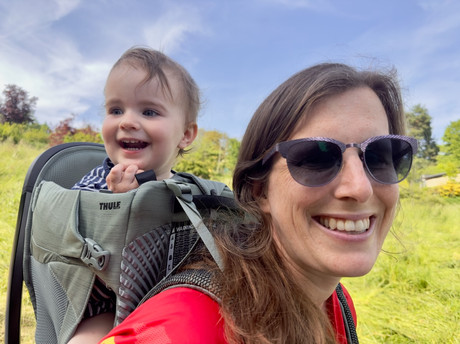We moved to Germany in August 2022. In our most recent (and hopefully last) job search, our priorities experienced a seismic shift - now The Bubs comes first, and then there's everything else. Therefore, we were quite pleased that a labor overlord in Germany was one of our finalists and ended up making us the best offer. There are few, if any, places where we would rather raise our spicy little Hurricane Penelope.
That said, Germany is not perfect. It is very good, but it is not perfect. Also - and this might sound odd to you if you watch too much news in the United States - it is not necessarily an easier place to live than, say, the UAE or Vietnam.
I'll explain.
Clean Living
Food
The 'five meals a day' idea was the original stimulus for this article - and we're getting there - but let's talk quality first.
To put this as tastefully as I can: our collective digestive experience alone paints us a clear enough picture - largely in a spattering of sepia tones - of food quality in the United States vs. the rest of the world, but the fuller picture of this (literally) painful truth adds so much more precision and scientific flair to the discussion, so Yallah:
As Jennifer Shore (2019) writes in "The American Food Supply: Not Fit for European Consumption" on the Focus for Health Foundation website, the EU does not permit "known or suspected carcinogens...in their food," citing the common use of Potassium Bromate and Azodicarbonamide (ADA) as ingredients in US foods as well as the strong presence of Glyphostate in genetically modified US foods. US-based food companies even produce different products for overseas distribution than for US distribution. As Shore explains, versions of the same or similar products in the US and the EU produced by companies such as Heinz and PepsiCo contain different ingredients - Quaker Oats is one example offered. The difference is typically that the EU products contain fewer chemical additives, which 1) might not comply with EU law, and 2) might simply be rejected by more discerning EU consumers.
Charlotte Markey, PhD, simplifies the EU vs. US food divide further in a 2018 article in US News & World Report: she brings up the "so-called 'French paradox'" to point out that in France - and, by extension, other EU states - the food is more likely to be, quite simply, real. Fats and sweets do not appear to be the enemy. An unhealthy culture of eating does, and this logically connects to the US tendency to pack additives and chemicals into foods: additives and chemicals help food products last longer and spoil less. They aid convenience that helps perpetuate an on-the-go 'American' lifestyle. European eating habits, in contrast, tend to be slower, more frequently and habitually social, and less focused on quantity. In Europe, Markey argues, it is more likely that more time will be taken to prepare and enjoy fresher foods. Based on our experience, we agree.
Water
Let's be clear upfront: in comparison to much of the rest of the world, both the EU and US typically boast very safe tap water for drinking and food preparation in most places under their jurisdictions. I mean, you know, fracking areas aside...
After reading about water quality law in the EU vs. the US in the EuropeNow academic journal, we tend to agree with Robin Kundis Craig (2018) when she points out in her article that the EU Water Framework Directive (WFD) is "More Comprehensive," i.e., less fragmented and more holistic, than the US Clean Water Act (CWA).
The CWA focuses on and "has (author's italics) dramatically reduced point source pollution" from discharge of specific pollutants, but it leaves a fair amount of responsibility to the states themselves and also provides "a number of exemptions...that limit its applicability." This "leaves many areas of water management untouched" in the US, which results in continuing challenges that the states must police themselves.
The WFD is a touch more ambitious as it "seeks to improve the overall status of water bodies." This makes the WFD more comprehensive, yes, but also more difficult to achieve and to enforce than the CWA, which provides a variety of avenues for litigation and very specific reasons that one might litigate.
Neither law is perfect, but the WFD "seeks to achieve 'good water status' in all European river basins." The CWA does "address...quality standards," but pretty much kicks it back to the states, calls it a day, and lets people sue each other if they want. We're not huge fans of states' rights politics, so we lean favorably toward the scope of the WFD, especially since we live on the largest lake in continental Europe. The WFD's ultimate success or lack thereof has not yet been determined; nevertheless, we feel more comfortable placing faith in European governance than US governance.
Energy
In response to the Fukushima nuclear disaster on March 11, 2011, the German Bundestag resolved to phase out all nuclear power in the country. You can read more about this on the Bundestag website, and I defy you to find a major news outlet that didn't also cover it.
The phase-out was realized with the closing of Germany's last three nuclear plants on April 15, 2023. We love this decision; nuclear waste is a terrible problem with which we have yet to fully reckon as a species - the less waste there is, the better. Moreover, there is, of course, the risk associated with operating a nuclear power plant. Is the risk of a meltdown worth the output? We're not convinced it is with so many alternatives. Chernobyl, Three Mile Island, Fukushima - when's the last time you heard about the devastating consequences of a solar or wind farm failure?
As reported by Reuters, EcoWatch, and others, renewable energy in Germany achieved a 55% share on the nation's power grids in 2023. This marked the first year that Germany cracked the 50% mark. Prost! The next major target is for renewables to generate at least 80% of power in Germany by 2030.
The US Department of Energy reports that renewables accounted for approximately 20% of power generated by the US grid in 2021, and Renewable Energy World cites the US Energy Information Administration to report that renewables generated about 25% of US power in the first half of 2023. According to a World Economic Forum report on March 9, 2023, use of renewables in the US has steadily risen since 2012, when renewables accounted for only 12% of US power generation.
The US is moving in the right direction, but we're far more impressed with what Germany has done. There's a much stronger commitment here, so we're far more comfortable with our tax revenue going to Germany instead of to the United States.
But Back to the Important Stuff: Food...
Southern German food is heavy and delicious, just the way I like it. Moreover, the Germans - at least the ones in the south - have a delightful meal schedule: five per day.
Breakfast
Second breakfast (it's a real thing, it's at 10:00, and it's probably reason enough to move here)
Lunch (almost universally at 1(3):30)
Vesper (be there at 4:00...ahem, 16:00...or you instantaneously vaporize)
Dinner
So the Germans eat for about six hours a day, which, I suppose, is why they have to walk and hike and ride their bikes the rest of the day. Genau. No wonder everything's always closed - everyone's too busy working off all that sausage and cake. Glorious.
Second breakfast typically consists of fruit, bread, all the spreads, cold cuts, the remaining first breakfast stuff, and coffee or tea. Vesper is a coffee and cake meal at 4:00 in the afternoon. I'll repeat that: It's a coffee and cake meal. It's at 16:00 sharp, and don't you forget it. You know you want der Kaffee...und Kuchen. And, I mean, it's an official meal, so you can totally still have dessert after dinner. Why would you not?
I knew there was a place in this world for people like me - where cake is a daily meal and people eat ice cream all the time, including 9:00 in the morning. In public. At an open ice cream shop. I've seen it. It's real. These are my people.
So the food situation is glorious. Check, check.
...and Coffee
Apparently, this is also the place in the world where The Boss belongs. Convenient! The Boss' coffee complex is well-documented, and Germany provides the ultimate fix. As one learns from the Coffee Break German podcast, German coffee culture is exceptionally accommodating for people like The Boss. One is well within cultural norms to enjoy (deep diaphragm breath): 1) morning at-home coffee, 2) on-the-way-to-work coffee, 3) morning at-work coffee, 4) second breakfast coffee, 5) Vesper coffee, and 6) after-dinner coffee. God bless.
Health Care
Health insurance is great in Germany, but the care is somewhat spotty and mediocre in the rural south. Meh. Take care of yourself, and get a pro opinion when necessary, I figure. We understand that the care is better in big cities and in the north in general, but we live about as far in the south of Germany as one can - the Florida of Germany as some have called it - so we just had to find practitioners who would tolerate our poor German language skills and had to make sure to establish ourselves as patients with a good primary care provider or Hausarzt. Like The Force, everything flows through the Hausarzt. Everything. It's somewhat akin to an HMO situation, but it's not quite so bad as all that. A good Hausarzt will hook you up with whatever you need, and it will never cost you anything out of pocket to go. We are fortunate to have found ourselves a good one.
We're still looking for a decent pediatrician, though...
Health care for our child is free, except every once in a while we have to pay €5 for a prescription for her. That's it. Oh, and the government gives us €250 per month - this is called Kindergeld or child money - simply because Penelope exists and we are her keepers. More on that in a minute.
We don't like Penelope's pediatrician, but we don't really have a choice. Medicine is territorial in Germany, and our area is largely rural and devoid of competent pediatricians. At least we can take her in when necessary and it doesn't cost anything out-of-pocket.
In fact, most of our prescriptions also only cost €5 either.
More on costs or lack thereof: No copays. No deductibles. No tricks. And we just have a standard public plan - not private, nothing special, everything we need. And this includes periodic derma screens, ophthalmology, gyno, half of our dental cleanings, etc.
Child Care
I mentioned a minute ago the gift of Kindergeld. What's more is that legitimate preschool starting at 18 months will only run you a couple hundred Euro per month. That's it. Not several hundred per week. Not a couple thousand per month. Approximately the amount of the Kindergeld, in fact.
Now it's not all strawberries and unicorns. You have to get on a list ASAP to get your little Bubs into a Kinderhaus, and then someone has to have space. How to get on the list? We can speak to the Bodenseekreis and City of Überlingen: register with Little Bird. After registering our top three choices with Little Bird, Penelope secured a spot at a Kinderhaus that we love and that she loves at 28 months - really not bad. She's a Kuken (a chick) now. Supercute. She'll have almost three years of preschool before Kindergarten. She'll be fluent in English and German before she enters primary school. There are few - if any - more valuable gifts we could give our baby.
Playgrounds...and Other Outdoor Activities...but Mostly Playgrounds
One of the best things about raising Penelope in our corner of Germany is she can spend an enormous amount of time outdoors. Better yet, there are TONS of parks and playgrounds, and the playgrounds here are incredible. We are so jealous of the contraptions Penelope gets to climb on.
As Philip Oltermann explains in an October 24, 2021 article in The Guardian, Germany's overarching playground equipment philosophy is to teach risk competence. Indeed, some of the playground structures we've seen here leave us in awe. They look so fun; they must be incredibly exciting - and somewhat intimidating at first - for the kids. The idea is that kids will learn to make smart choices and protect themselves from harm in a relatively controlled environment that offers a certain degree of danger. Natural apprehension when approaching such equipment leads to kids learning when, how, and why to be extra careful.
Oltermann cites a landmark February 2004 study by Kambas, et al. in the German Journal of Sports Medicine to explain why insurance companies tend to accept this philosophy. The study found that an increase in motor proficiency in kindergarten-age children reduces overall number of accidents. It's pretty much as simple as that.
Again, the playgrounds here just look like incredible fun to us bumbling adults, but if they make Penelope stronger, safer, and better-prepared to deal with risk, we'll take that, too.
Playgrounds are, of course, only part of the outdoor advantages here. We are able to run, hike, and bike all the time. We can see the Swiss Alps from our street. It's extremely safe and an overall healthy existence.
No Honeymoon, No Problem
The other farther away more 'exotic' places we lived had lengthy transitional periods during which time our corporate overlords smoothed certain things out and provided this or that sort of assistance.
Germany, however, provided no such honeymoon. To a certain extent, though, we appreciate that. This is more of a 'normal' existence - we have no expat bubble; our wages aren't astronomical compared to the local per capita GDP; we needed a car immediately to get anything done (this last one is a product of living in a rural area, which is entirely new to us).
In short, there was no honeymoon period during which time we had stars in our eyes and thought everything seemed so novel and cool. Germany has no real need to import English-speaking talent like the UAE and Vietnam and Hong Kong and so many other places, so we just had to get down to it: furniture, doctors, baby stuff, car stuff -- figure it out. Mostly in German. It's a far more normal middle-class existence, and we largely appreciate it. The honeymoons in our last couple stops crashed hard, and there was no elevated state from which to crash here. We like not crashing.
Germany isn't perfect, but that tends to make it a little more perfect for us. We have the conveniences of the West without having to enter an expat bubble to access them, and we didn't have to repatriate to a place where we have to worry about guns, hyper-partisan politics, and the costs of child care and health care. The language barrier is currently an obstacle for The Boss and me, but so what? That will improve with time, and Penelope will be entirely, fluently bilingual and biliterate.
We think - we hope - that we have found a forever home...or at least something close to it until we retire to a warm, Spanish-speaking country in about thirty years to drink sangria and margaritas until we expire. Aha! Look how German the five meals a day have already made me with casual morbidity...
In case you need to know anything else about assimilating into German culture, follow Jordan Prince (@jordanprince) on the Instathing. You're welcome.
If you enjoyed this article, sign up to become a member and find us on your favorite social media platform. Paws for travel!











































Germany provides a unique, balanced lifestyle with quality food, renewable energy, affordable healthcare, and a family-friendly environment. Five meals a day, scenic playgrounds, and bilingual opportunities for kids make it an enriching experience. MCDVoice Survey – Your Chance to Refine McDonald's Menu Selections.